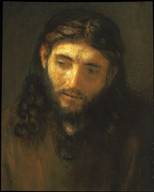
I have followed with great interest the Pope's visit to the UK and have been glad to see the encouragement it has brought not only to the Roman Catholic community here, but to all Christians. I listened to the evening service from Westminster Abbey, ordered in the best of the English cathedral choral tradition, and was moved by the expressions of fraternal friendship between the Pope and the Archbishop. But I have to say I was disappointed, as I am often am, with our Archbishop's address. Both he and the Pope are academic intellectuals of note, but Dr Williams always seems to cloud his speeches with obscure intellectual language. In particular I noted the number of times he and the Pope referred to 'Christ': 3 times by the Archbishop, but 10 times by the Pope.
The Pope gave what I though that was a clear and explicit description of the gospel and its implications for Christian unity
Our commitment to Christian unity is born of nothing less than our faith in Christ, in this Christ, risen from the dead and seated at the right hand of the Father, who will come again in glory to judge the living and the dead. It is the reality of Christ’s person, his saving work and above all the historical fact of his resurrection, which is the content of the apostolic kerygma and those credal formulas which, beginning in the New Testament itself, have guaranteed the integrity of its transmission. The Church’s unity, in a word, can never be other than a unity in the apostolic faith, in the faith entrusted to each new member of the Body of Christ during the rite of Baptism. It is this faith which unites us to the Lord, makes us sharers in his Holy Spirit, and thus, even now, sharers in the life of the Blessed Trinity, the model of the Church’s koinonia here below.
The Pope gave what I though that was a clear and explicit description of the gospel and its implications for Christian unity
Our commitment to Christian unity is born of nothing less than our faith in Christ, in this Christ, risen from the dead and seated at the right hand of the Father, who will come again in glory to judge the living and the dead. It is the reality of Christ’s person, his saving work and above all the historical fact of his resurrection, which is the content of the apostolic kerygma and those credal formulas which, beginning in the New Testament itself, have guaranteed the integrity of its transmission. The Church’s unity, in a word, can never be other than a unity in the apostolic faith, in the faith entrusted to each new member of the Body of Christ during the rite of Baptism. It is this faith which unites us to the Lord, makes us sharers in his Holy Spirit, and thus, even now, sharers in the life of the Blessed Trinity, the model of the Church’s koinonia here below.
The Archbishop seemed to major on the Benedictine way of life, and hardly mentioned Jesus Christ at all:
And in this, we are recalled also to the importance among the titles of the Bishops of Rome of St Gregory's own self-designation as 'servant of the servants of God' – surely the one title that points most directly to the example of the Lord who has called us. There is, we know, no authority in the Church that is not the authority of service: that is, of building up the people of God to full maturity. Christ's service is simply the way in which we meet his almighty power: the power to remake the world he has created, pouring out into our lives, individually and together, what we truly need in order to become fully what we are made to be – the image of the divine life. It is that image which the pastor in the Church seeks to serve, bowing down in reverence before each human person in the knowledge of the glory for which he or she was made.
And this is not the first time he seems to have been embarrassed by the name of Christ. I remember hearing him trying to persuade John Humphries of the truth of the gospel, and just seemed to end up tying himself in philosphical knots rather than appealing to the historic basis of our faith.
I am by conviction an Anglican, and would not want to change that, but I can't help feeling that the Pope, on this occasion, articulated much about our faith that the Archbishop doesn't or can't.

No comments:
Post a Comment